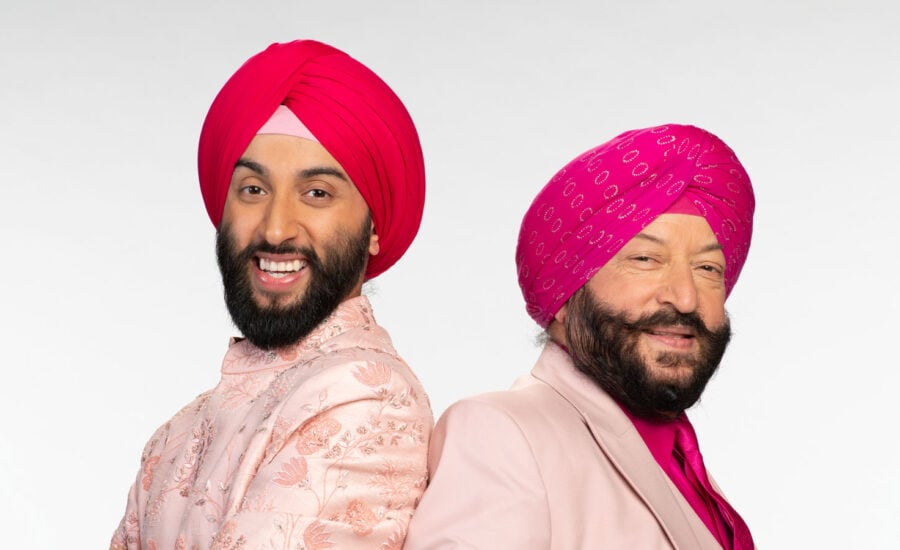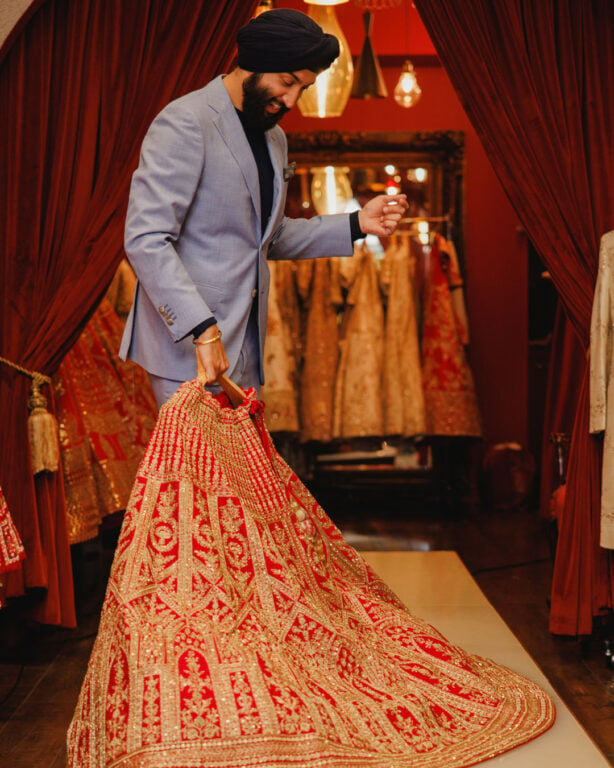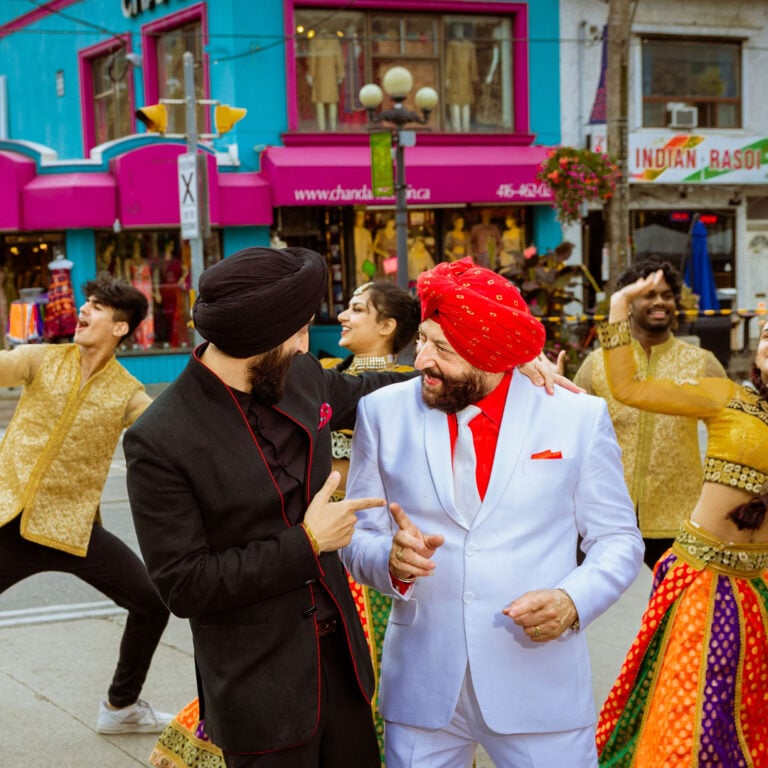Bollywed’s Kuki and Chandan Singh on making it in Canada—and on TV
Money comes up a lot in an intergenerationally run business led by this father-son duo. Find out what they agree and disagree on.
Advertisement
Money comes up a lot in an intergenerationally run business led by this father-son duo. Find out what they agree and disagree on.

If you’ve seen Bollywed, then you know the CBC/CBC Gem reality show showcases South Asian culture, fashion and money—as well as the intergenerational drama and humour of the Singh family. They own bridal boutique Chandan Fashion in Toronto’s Little India. If you haven’t seen the show, know that it stars father Kuki Singh and son Chandan Singh, who are front and centre as they manage the store and their relationship. The two Singhs answer the My MoneySense questions with a unique perspective—being Canadian celebrities, Canadian immigrants and family business owners, and belonging to different generations. Find out how they tackle the most complicated topic for any family: money.
Kuki: My father taught me all my lessons today about money.
Chandan: Jim Rohn taught me a simple lesson about what to do with my income at an early age. That’s 70% towards expenses, 10% to charity, 10% to active investments and 10% to passive investments. And I have done my best to keep those fundamental lessons to this day.
Kuki: I love to watch the Toronto Maple Leafs play. I love sports. Sports are my favourite hobby.
Chandan: I love to travel, if I am spending time with my wife. Eating good food in a new city or country while exploring the local streets is a special feeling. I get to slow down and be present. When alone at home, I love escaping to a different world or time period on my PS5/Xbox/Nintendo through a video game.
Kuki: I would like to spend more time with my granddaughter and friends.
Chandan: I would like to take a four-week vacation and travel the world, while being able to work remotely and checking into my businesses from afar. I love what I do for a living—being a part of a couple’s wedding journey never feels like work. However, the longest vacation I ever took was one week. So being able to take more time off of work would feel like a luxury.
Kuki: Roller skates. I always wanted roller skates, and no one had them in my village. I was the first. I would hold on to the back of trolleys and go from one village to another. The local villagers would yell at me that I would hurt myself. But I was never scared. It’s a good memory.
Chandan: One day my dad came home with boxes of chocolate bars which he bought in bulk. I think he got a good deal from the local supermarket. I must’ve been 10 years old. I got sick of eating the chocolate in a few days, so I packed them in my lunch box and sold them for $1 to $2 a piece to my peers during lunch and recess without my parents knowing. I remember going into an Asian shop across from Gerrard Square Mall and they sold Pokémon cards, and other trinkets like these glitter bracelets. I don’t know why, as a boy in grade 5, I thought it would be a good idea to take this money I had saved up and buy glitter bracelets. I had a feeling they would be a hit—and they were. I must have sold about $100 worth of bracelets that week. I took that money and put it aside to fund my next venture, flipping designer polos. I saved up the money I earned from that, and then invested in a dozen Xbox consoles when they just launched. I got scammed. I lost it all. I learned a lot about entrepreneurship as a child, probably from watching my parents work from behind the store counter.

Kuki: Working at my father’s store. I wasn’t allowed to work anywhere else. I took my first paycheque to the temple and donated it. I also did service and fed all the homeless in the area. I have very many good memories of times like these.
Chandan: Like my father, I wasn’t allowed to work outside of the family business, despite how much I begged to get a “real” job. But my father insisted I work at our store, behind the counter, learning the family business. When I moved away to university, I picked up my first job within the first week at Mad Scientist, teaching the basics of science to children in grade 1 and 2 in a fun way. I enjoyed it a ton, but I was let go within a few weeks for being late. “CST,” my wife would say—Chandan Standard Time. Then I got offered a job as a sous-chef at the local cafeteria across campus, and I developed my passion for cooking. I spent so much time and money eating there, the head chef asked me if I wanted the job. I worked there for as long as I could, before deciding I needed to focus on my grades. I took my first paycheque and gave it to my parents as a sign of respect. And my dad made me do the same thing he did, in the end, so I donated it.
Kuki: You have to respect money each and every day. If you are honest and hard-working, you will never have problems with money. Without honesty, you will never be successful. Trust me. I have seen it my whole life.
Chandan: “Money comes easily and frequently” is a mantra I learned a few years ago. The day I stopped chasing money and stopped worrying about having enough of it, my life changed.
I used to get so upset about losing money or angry about losing a deal. When I first got scammed for those dozen Xbox consoles, I wrote some nasty emails and saw a side of myself I didn’t like. I am sure it went on deaf ears, but I became conscious of what losing money can feel like. I put a pin on the feeling and explored it as I got older.
Chandan: I was told that my parents dug for a diamond for 20 years, and that it’s my job to cut and polish the diamond to take it to the next level. If I could do that successfully, I would have a head start and I wouldn’t have to worry about money. I am still working on that.
Kuki: To spend. Whenever your friends tell you to spend money here or there, use your own brain. Think to yourself, “Is it right for me and my family?”
Kuki: Never kill your golden goose. If you can have consistent money for the rest of your life, never take away that source.
Chandan: A classic immigrant story: Growing up with not much to having plenty as an adult, I would be okay with a smaller amount every week or month as long as it covered the roof over my head and the expenses for my family. At the end of the day, my goal is to have a consistent, reasonable passive income stream.
Kuki: To listen to your parents. Your parents will never guide you wrong.
Chandan: Start investing, even with as little as a few dollars. It’s about building the right habits. Also, if you aren’t giving away even just a few dollars, you certainly aren’t going to do it when you’ve achieved millions.
Kuki: That you need a lot of money to start. You don’t need a lot. You just need to use your head and work hard.
Chandan: There’s no money to be made in—you fill in the blank. Oftentimes people will discourage you from investing in “whatever” because they don’t want to see you hurt or lose money. But risk is a part of life. You can’t grow it if you don’t risk it. Once you come to terms with that, I think the mentality around money would change.
Kuki: I regret not investing sooner. When I first wanted to buy property, I didn’t. Now those same places are selling for five times their value within just a few short years.
Chandan: No regrets, just learning lessons of what to do or not do in the future.
Kuki: Each dollar should have value. I think 10 times before spending each dollar when needed. When you know the value of money, you won’t hesitate spending it either. Going out with my family for dinner? I never look at the bill, just the enjoyment.
Chandan: I’ve grown to learn the value of time and its relationship to money. I also value time itself. For example, in the past, I may have booked a direct flight to a destination because I valued my time and paid the premium for that. Now, I wouldn’t mind taking a stopover for a cheaper flight and enjoy the journey alongside my wife and value that time itself. Or I would book a cheaper hotel the first night, and then splurge on a wonderful five-star luxury resort the next night. I value the experiences and what value my money can bring to me.
Kuki: My store. When I first came to Canada, I worked overtime to save enough to pay for the rent on my first shop in 1984.
Chandan: My condo, which I am very proud to own. When I was on a date with my then-girlfriend for the Christmas market in [Toronto’s] Distillery District, we were kicked out of a condo foyer for warming up. A few years later, I ended up buying a condo in that same building and moved in with my now-wife.
Kuki: Don’t take on any debt you can’t control. When you lose control you lose everything.
Chandan: Money is a tool. Healthy debt is good—it’s using finances as a tool. Once you understand that relationship, it should change things for you. Bad debt is credit card debt, and that’s the stuff you want to manage and control as much as possible.
Kuki: I ordered 20 suits from India just in time for the show. My closet needed some new pieces.
Chandan: I bought a new Tesla Model Y. Maybe I could have purchased a more affordable car. At the same time, tomorrow is never guaranteed.
Chandan: Sell or Be Sold by Grant Cardone. I saw excerpts of the book and I was curious about this man—the flamboyant, loud-spoken multi-millionaire. There are some amazing nuggets in the book.
Kuki: I always keep cash on me at all times. Oh, and pictures of my kids.
Chandan: My ID and, most recently, an Apple AirTag. I will never lose my wallet again.
Kuki: My collection of suits and matching turbans. I love fashion.
Chandan: I’m not fixated on any one thing, really. But one thing I can’t live without is my AeroPress for making fresh coffee every morning, while I do my morning rituals.
Kuki: Now it’s time for my kids to decide, I want to retire with grandkids.
Chandan: My father can never retire. He’s incapable, like his father before him. So, I would say to have enough income that I can actually say to my family, “Look, I got you. We got each other. We’re good.” It’s not an imaginary number. You can actually calculate it by figuring out what your living expenses need to be and then working backwards, subtracting taxes and other expenses.

Kuki: Own property, you will always have assets in your name.
Chandan: I’ve been taught from a young age that renting is like throwing money down the drain. But now, as I’m older, I understand the power of investing. Which avenue to invest in is correct right now? For example for our second location, I was adamant on purchasing a place. In order for my vision to come true, the cost to own, renovations and merchandise alone made it infeasible. Instead of getting stuck, we chose to pivot to renting for now, hitting the ground fast, and then saving up that income to work on my dream location.
Kuki: Buy.
Chandan: Buy.
Kuki: If you invest, you can grow money. You should not be scared to invest.
Chandan: Save, then invest. Then save again, then invest some more. Repeat until wealthy.
Kuki: Unfortunately, I cannot comment as my wife handles all the accounting, as math is not my subject.
Chandan: It’s very important to budget. A budget allows you to hit even higher targets that you thought weren’t possible or within reach. Or, it can teach you to scale back.
Share this article Share on Facebook Share on Twitter Share on Linkedin Share on Reddit Share on Email